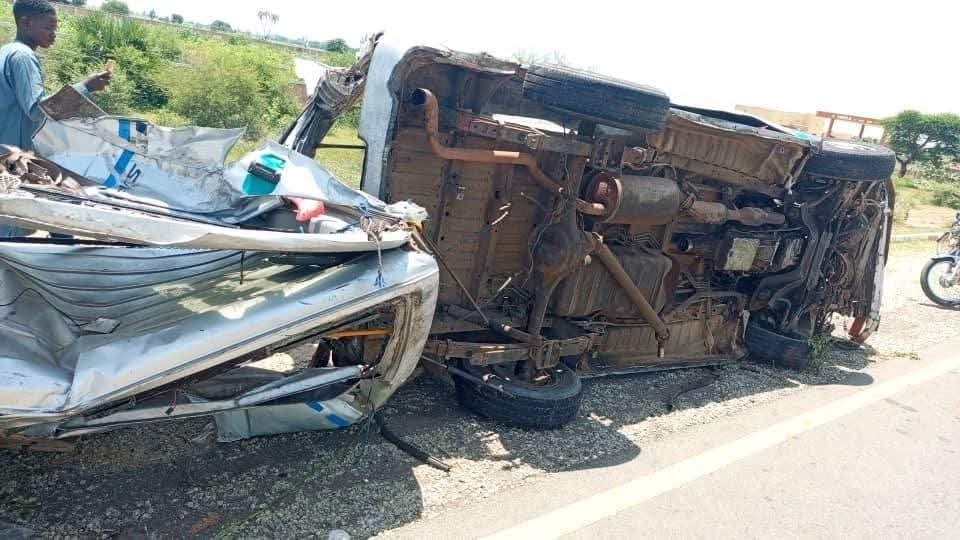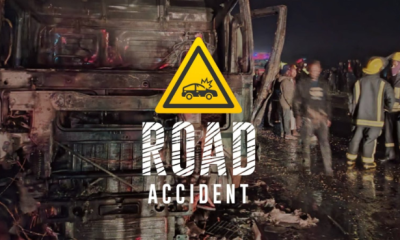Driver Training
How Impatience and Indiscipline Are Killing More Motorists Than Bad Roads

The Silent Killer on Nigerian Roads. Every day, millions of Nigerians hit the road from Lagos’ chaotic Third Mainland Bridge to the winding expressways of Enugu, Benin, Kano, and Abuja.
Also Read:The Dangers of Impatience in Driving
Yet, while potholes, poor lighting, and bad road designs are often blamed for fatal crashes, experts now agree that the real enemy behind the wheel is not asphalt, but attitude.
In the past five years, the Federal Road Safety Corps (FRSC) has consistently ranked driver behavior, especially aggressive and impatient driving among the top three causes of road accidents nationwide. But what exactly drives this aggression? Why do so many Nigerian drivers behave as though the road belongs solely to them?
A RoadKing.ng special investigation reveals that behind most major crashes lies a dangerous mix of impatience, ego, poor training, and a total disregard for traffic laws, behaviors that are fast turning Nigeria’s highways into war zones.
The Numbers Don’t Lie: Human Error Tops the List
According to the FRSC’s 2023 Accident Report, over 11,994 crashes were recorded across the country between January and September. Of these, more than 71% were attributed to “human error”, a technical term for behaviors like overspeeding, tailgating, dangerous overtaking, or driving under the influence.
A further breakdown shows:
| Primary Cause | Percentage of Accidents (2023) |
|---|---|
| Speeding | 46% |
| Reckless overtaking | 13% |
| Driver distraction (phones, fatigue, arguments) | 9% |
| Drunk driving / impairment | 3% |
| Poor road condition | 17% |
| Vehicle fault (mechanical) | 12% |
These numbers confirm what many commuters already know: Nigerian drivers, particularly commercial bus and truck operators, often treat the road as a personal racetrack.
Case Study: Lagos–Ibadan Expressway, A Highway of Chaos
The Lagos–Ibadan Expressway, one of Nigeria’s busiest routes, records more than 30 crashes monthly according to FRSC data. Despite ongoing reconstruction, the major issue isn’t always potholes, it’s recklessness.
Drivers weave through traffic without signals, honk aggressively, and ignore lane markings. Commuters complain that “Danfo” bus drivers stop abruptly in the middle of the road to pick passengers, while impatient private car owners swerve dangerously to overtake.
In a viral video captured in September 2023, two commercial drivers were seen racing side-by-side in Ogun State, trading insults and pushing each other off the lane right in front of a moving tanker. Seconds later, one bus lost control and somersaulted. Five passengers were hospitalized.
A survivor, identified as Titi Adegoke, told RoadKing.ng:
“I begged the driver to slow down. He said, ‘Don’t worry, I’m an expert.’ The next thing we knew, the bus flipped. That man’s confidence almost killed us.”
This arrogance and overconfidence often mistaken for “driving skill” remains one of the most toxic behaviors on Nigerian roads.
Understanding Aggressive Driving: The Psychology of the Nigerian Driver
Aggressive driving is more than just speeding. It’s a mindset, a dangerous mix of stress, frustration, and lack of empathy.
A 2023 study by the University of Lagos’ Transport Research Unit identified four dominant emotional triggers among Nigerian drivers:
- Frustration with traffic congestion
- Perceived disrespect from other drivers
- Economic pressure (rush to make more trips)
- Cultural normalization of aggression (“sharp guy” mentality)
These emotions often lead to behaviors like:
- Intentionally blocking others from overtaking
- Ignoring pedestrian crossings
- Tailgating slower vehicles
- Running red lights
- Verbal abuse and road rage
For commercial drivers, aggression is often tied to daily targets. A bus driver in Lagos explained:
“If I don’t rush, I’ll make only three trips a day. That means I can’t deliver my balance to the owner. It’s not pride, it’s survival.”
Unfortunately, that “survival mode” mindset costs lives daily.
When one impatient driver breaks a rule, it forces others into defensive or equally reckless maneuvers. On a narrow two-lane road, one wrong overtake can lead to a chain reaction, resulting in head-on collisions, pedestrian deaths, and highway pileups.
RoadKing’s analysis of over 200 crash reports in 2023 found that in more than 60% of cases, multiple vehicles were involved, showing how one driver’s carelessness can endanger dozens of others.
In August 2023, along the Benin–Auchi road, an impatient truck driver tried to overtake another heavy-duty vehicle on a blind bend. The result: a devastating crash involving four cars, leaving eight dead and several injured. FRSC officials described the scene as “avoidable and heartbreaking.”
The Law and Its Weak Enforcement
Nigeria’s traffic laws are clear, reckless driving, overtaking on bends, and exceeding speed limits are all offenses punishable by fines or imprisonment. But the enforcement remains inconsistent.
While the FRSC performs commendable work nationwide, challenges persist:
- Limited manpower to cover thousands of kilometers of federal roads
- Lack of functional speed cameras and roadside monitoring systems
- Political interference when offenders are arrested
- Corruption that allows repeat violators to go unpunished
In many states, drivers now see road safety rules as optional. Even commercial operators whose licenses have been suspended often return to the road the next day through backdoor routes.
The Culture Problem: When Recklessness Becomes Normal
In Nigeria, aggression behind the wheel is often glamorized. “Fast driving” is equated with skill, while caution is mocked as timidity.
A RoadKing street survey across Lagos, Onitsha, and Kano found that:
- 63% of drivers believe “speeding shows confidence.”
- 52% said “traffic laws are meant to be flexible.”
- 29% admitted to “driving angry” at least once weekly.
These statistics reveal a deep-rooted cultural issue: many Nigerians see road discipline as weakness. Until this mentality changes, no amount of road expansion or asphalt quality can end fatalities.
RoadKing Analysis: Top 5 Behavioral Patterns Behind Fatal Crashes
| Behavior | How It Leads to Deaths | Example Incident (2023) |
|---|---|---|
| Overspeeding | Reduces reaction time | Lagos–Ibadan crash, March 2023 (9 dead) |
| Dangerous overtaking | Causes head-on collisions | Benin–Auchi road, Aug 2023 (8 dead) |
| Tailgating | Chain collisions in traffic | Abuja–Lokoja, May 2023 (5 injured) |
| Ignoring traffic lights | Pedestrian deaths, side impacts | Onitsha–Owerri, July 2023 (2 dead) |
| Distracted driving | Phone use, music, eating | Kano–Zaria, Feb 2023 (4 injured) |
(Source: RoadKing.ng data compilation, 2023)
The Road Ahead: What Needs to Change
1. Driver Education Must Go Beyond Licensing
Driver training in Nigeria often focuses on how to move a car, not how to behave on the road. FRSC must update training curricula to include emotional control, empathy, and stress management.
2. Deploy Smart Road Policing
Nigeria urgently needs digital enforcement, speed cameras, dashcams, and automated number-plate recognition. Real-time tracking will help deter habitual offenders.
3. Public Transport Reform
Commercial drivers must be made accountable through verified unions and fleet tracking systems. Owners should face penalties for reckless drivers under their employ.
4. Aggression Awareness Campaigns
Just as there are campaigns against drunk driving, Nigeria needs sustained public sensitization against aggressive driving with relatable TV, radio, and social media messaging.
5. Behavioral Rehabilitation
First-time traffic offenders should undergo short-term psychological training instead of just fines. Aggression is often a learned behavior, it can be unlearned.
A Global Comparison
Countries like South Africa and Kenya, which once had similar issues, have significantly reduced road rage incidents through:
- Mandatory defensive-driving re-certification
- Speed-governor enforcement on public vehicles
- Strict penalties for overtaking violations
Nigeria can learn from these models. Safety must be built into behavior, not just asphalt.
Conclusion: Driving Is Not a Battle
Until Nigerian drivers begin to see the road as a shared space not a battleground accidents will persist. The truth is simple: the road doesn’t kill people; people do.
As the late FRSC Corps Marshal, Dr. Boboye Oyeyemi, once said:
“Speed and impatience are like fuel and fire, when combined, they burn lives.”
Every driver has the power to make a difference by simply slowing down, yielding way, and thinking beyond ego. Lives depend on it.























